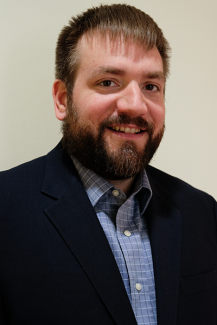Event
Organic Chemistry Seminar: Dr. Joshua Sieber, VCU
“New Tools for the Asymmetric Synthesis of Heteroatom-Rich Organic Compounds”

Abstract
-Chiral organic compounds containing stereogenic carbon atoms having heteroatom substituents (e.g. amines and alcohols) are extremely valuable due to their important biological activities. As a result, stereoselective methods to access such functional groups are desirable. Additionally, because many important organic compounds contain multiple heteroatom stereocenters, synthetic methodology to enable installation of several heteroatoms in a single step through a stereoselective convergent coupling approach would be highly efficient. This seminar will describe the development of convergent and site-selective coupling approaches for the asymmetric synthesis of dissonant chiral aminoalcohols, diamines, and amines from simple, readily available starting materials enabled by the addition of a chiral polarity-reversed (umpolung) nucleophile to a prochiral electrophile.
Research
Research in the group is focused on the development of new catalysts and catalytic reactions for application to the synthesis of complex organic molecules of biological significance (e.g. active pharmaceutical ingredients, APIs and natural products) in a cost-effective, safe, scalable, and sustainable manner from readily-available feedstocks.
Cu-catalyzed “umpolung” techniques for the asymmetric synthesis of poly-heteroatom functionalized organics.
Chiral organic molecules having multiple polar heteroatom functional groups (FGs) are prevalent in nature and have widespread applications in chemistry and the pharmaceutical and material sciences (e.g. aminoalcohols, diols, diamines, etc.). Therefore, methodology for the stereoselective synthesis of such compounds is required to access these valuable products. However, due to the polar nature of these FGs, certain substitution patterns can be difficult to prepare when these polar groups lead to mis-matched polarity profiles (dissonant relationship). “Umpolung” chemistry aims to reverse the inherent polarity of a typical FG to overcome this problem. The Sieber group has been interested in utilizing reductive coupling approaches through Cu-catalysis to access polarity reversed α,γ-aminoanions that react with various electrophiles (e.g. carbonyls or imines) to provide chiral diamines and aminoalcohols in an asymmetric fashion. Initial studies reported stereocontrol through use of a chiral auxiliary whereas the current major focus of the group centers on stereocontrol through use of a chiral catalysts.
https://sieberresearchgrp.com
Host: Dr. Kozlowski
